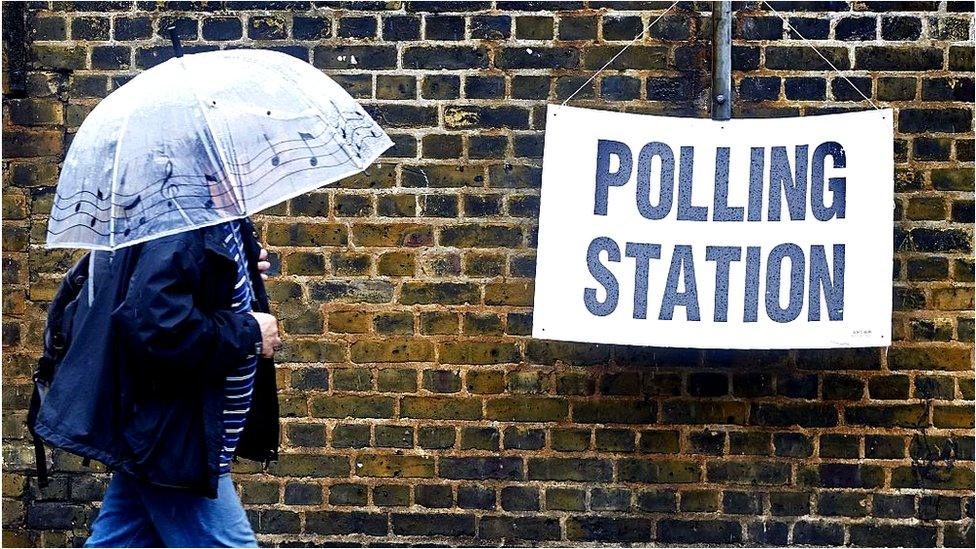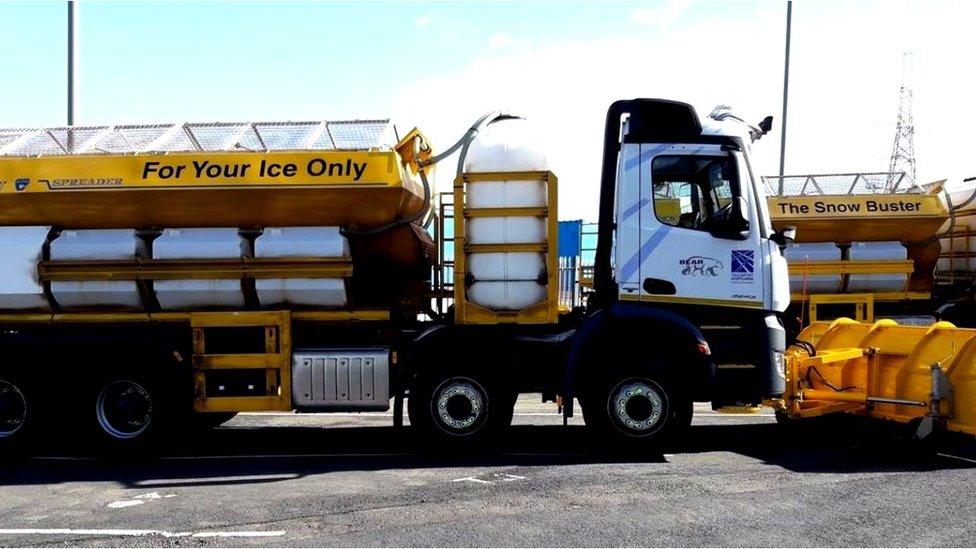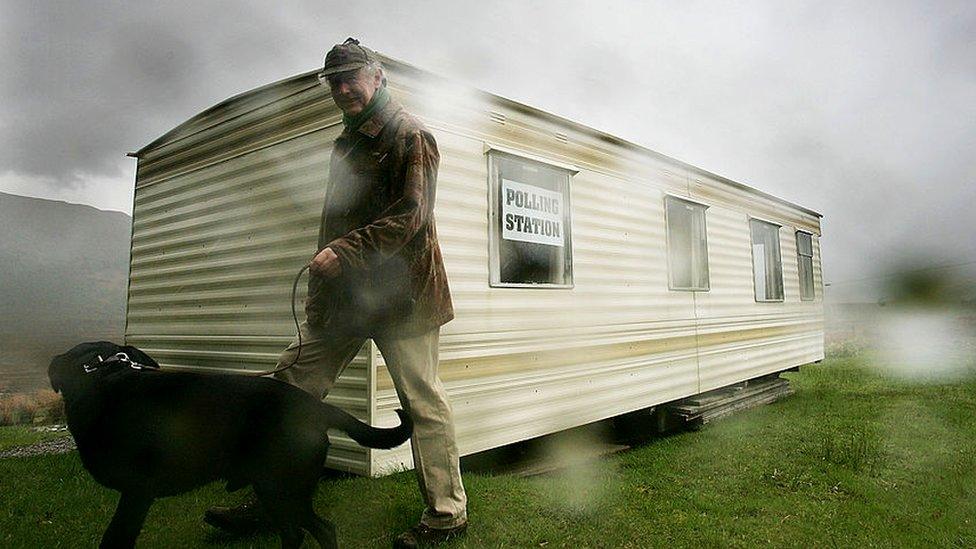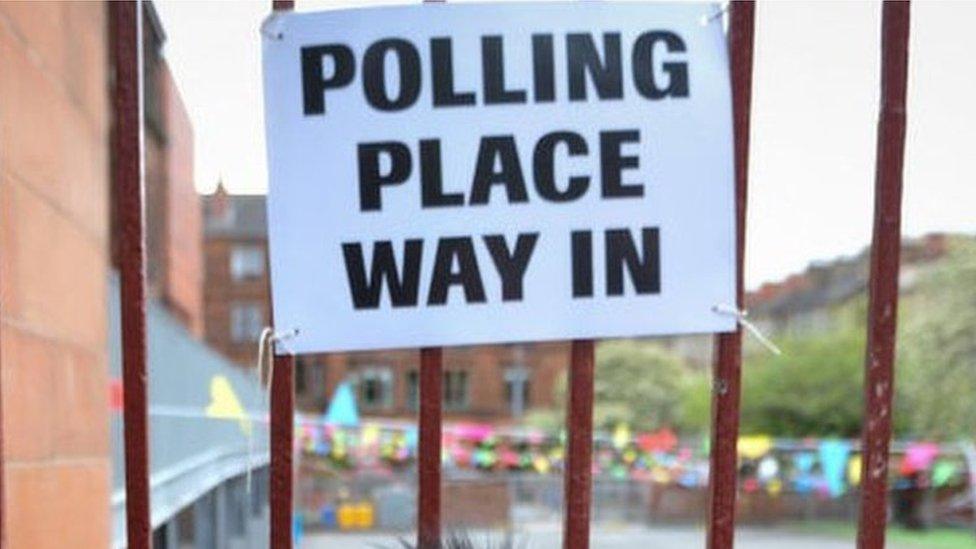Can Scotland's councils handle a poll in December?
- Published

Bad weather might just be the start of the problem for councils organising a winter election
Scotland's councils are facing up to the first winter general election for 45 years.
It's their job to provide polling places and organise counts in their areas.
The December poll presents them with a set of challenges.
But while some risks are real, others may be overstated. How hard will it be to for the local authorities to slot an election into the busiest time of the year for most communities?
Short notice
In recent years, the dates of many major elections - including Holyrood elections, nationwide council elections and the independence referendum - have been known well in advance.
The Fixed Term Parliaments Act was meant to provide a similar degree of certainty for Westminster elections.

The Emirates, where the Glasgow area count is usually held, will be in use for the Scottish Open snooker championships at the time of the election
But this is the second time in three years that a Westminster election has taken place on a date which could not have been anticipated at relatively short notice. Councils, though, have been aware of the likelihood of a snap election.
Still, not knowing the date until relatively close to the poll can lead to practical problems. Venues normally used as polling places or counting centres may be booked and contracts have to be honoured.
The most high-profile example of this concerns the count in Glasgow.
All Glasgow constituencies are counted at one centre - in recent years the Emirates Arena has been used.
But this cannot be used on 12 December because of the Scottish Open snooker championships.
The council has yet to confirm its alternative venue.
Schools
But perhaps the risk to schools has been overstated.
Many councils still use primary schools as polling places, although a number have consciously stopped doing so.
For instance, Moray Council explained: "Nearly all our polling stations are non-school. A decision to change polling stations in Moray from schools to alternatives over the last 18 months means just one school will have to close on polling day. We have identified a non-school facility for the count that suits our needs in Elgin."
Fife Council said: "We won't be able to 100% confirm polling place availability until we have a date, but on this occasion we wouldn't intend to close any schools."

Winter resilience planning should ensure the roads to polling stations are clear
If a primary school is used for polling, it simply means the children get an extra day off school.
The issue is no different regardless of the time of year.
Of course, some schools may have nativity plays or concerts pencilled in for 12 December.
But moving these to another date at six weeks' notice is unlikely to prove a serious problem.
Weather
The biggest additional risk a winter poll may present is that of severe weather on polling day.
For an urban council, this may come under normal winter resilience planning.
If roads are blocked or dangerously icy, they have programmes in place. For instance, priority is usually given to major arterial routes, bus routes or roads leading to hospitals. Fife said: "We will monitor forecasts and put contingency plans into place if we need to, such as extra lighting if required.
Ensuring there are no problems delivering ballot boxes to counts will clearly have to be a priority.
Some rural councils or authorities covering islands may find this issue particularly acute.

Getting ballot boxes to and from remote polling stations could be a challenge
For instance, there may be polling places in isolated locations where there could be a heightened risk of a road being blocked.
Highland Council explained: "If weather conditions were severe, we would set up a multi-agency coordinating group to assist with any events or incidents during the election process. We would also need to increase gritting around polling stations and check that lighting was sufficient around polling stations to ensure safe access and egress by voters and election staff."
Authorities covering islands often have complex logistical operations to get the ballot boxes to counts - perhaps using boats or helicopters.
There is a risk that very strong winds could hamper these.
If that were to happen, it would simply mean that a declaration would have to be delayed.
But if the election result is on a knife-edge, late declarations from rural seats could prove unusually significant.
- Published30 October 2019
